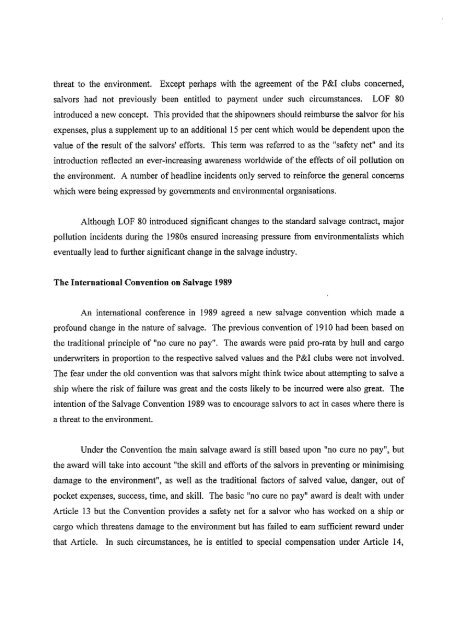Graham Daines - Scopic Paper.pdf - Comite Maritime International
Graham Daines - Scopic Paper.pdf - Comite Maritime International
Graham Daines - Scopic Paper.pdf - Comite Maritime International
You also want an ePaper? Increase the reach of your titles
YUMPU automatically turns print PDFs into web optimized ePapers that Google loves.
threat to the environment. Except perhaps with the agreement of the P&I clubs concerned,salvors had not previously been entitled to payment under such circumstances. LOF 80introduced a new concept. This provided that the shipowners should reimburse the salvor for hisexpenses, plus a supplement up to an additional 15 per cent which would be dependent upon thevalue of the result of the salvors' efforts. This term was referred to as the "safety net" and itsintroduction reflected an ever-increasing awareness worldwide of the effects of oil pollution onthe environment. A number of headline incidents only served to reinforce the general concernswhich were being expressed by governments and environmental organisations.Although LOF 80 introduced significant changes to the standard salvage contract, majorpollution incidents during the 1980s ensured increasing pressure from environmentalists whicheventually lead to further significant change in the salvage industry.The <strong>International</strong> Convention on Salvage 1989An international conference in 1989 agreed a new salvage convention which made aprofound change in the nature of salvage. The previous convention of 1910 had been based onthe traditional principle of "no cure no pay". The awards were paid pro-rata by hull and cargounderwriters in proportion to the respective salved values and the P&I clubs were not involved.The fear under the old convention was that salvors might think twice about attempting to salve aship where the risk of failure was great and the costs likely to be incurred were also great. Theintention of the Salvage Convention 1989 was to encourage salvors to act in cases where there isa threat to the environment.Under the Convention the main salvage award is still based upon "no cure no pay", butthe award will take into account "the skill and efforts of the salvors in preventing or minimisingdamage to the environment", as well as the traditional factors of salved value, danger, out ofpocket expenses, success, time, and skill. The basic "no cure no pay" award is dealt with underArticle 13 but the Convention provides a safety net for a salvor who has worked on a ship orcargo which threatens damage to the environment but has failed to earn sufficient reward underthat Article. In such circumstances, he is entitled to special compensation under Article 14,
















